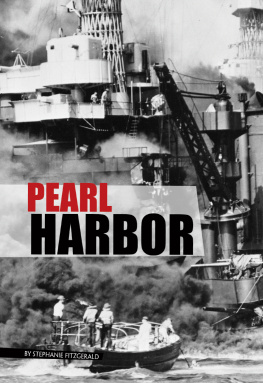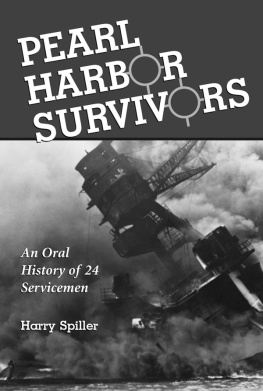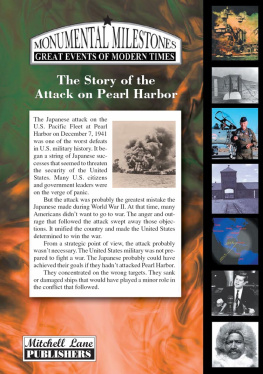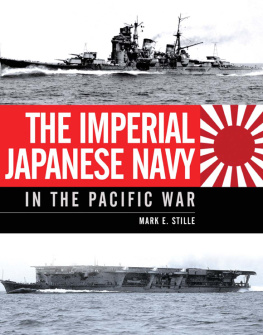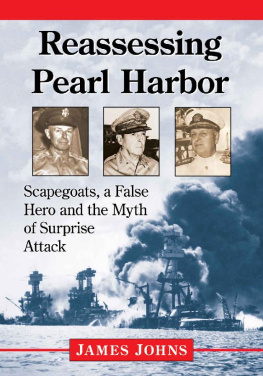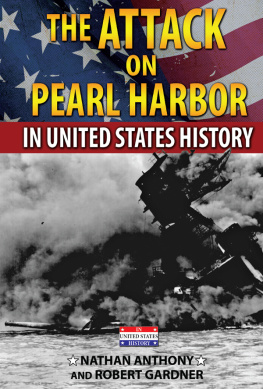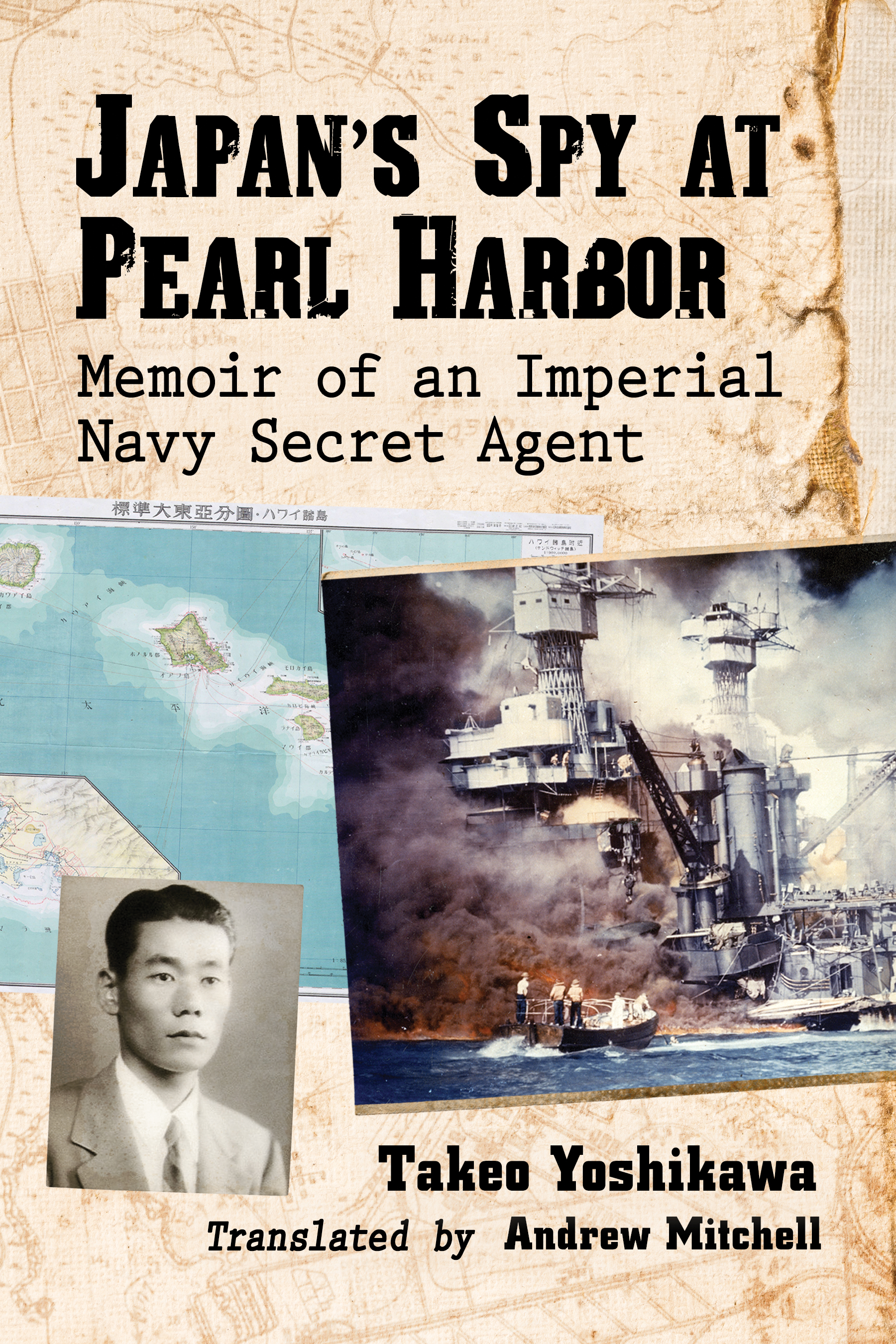Translators Foreword
Although nearly eight decades have passed since the Day of Infamy at Pearl Harbor, United States citizens and others continue to commemorate those who paid with their lives and those who were injured during Japans surprise attack. The USS Arizona Memorial in Pearl Harbor is a focal point for people wishing to pay tribute to the servicemen and civilians killed or wounded by the attack that started the Pacific War.
The battleship Arizona sunk after it was struck repeatedly during the attack, and most of its crew died inside the submerged vessel. Left in place in the harbor, the hull of the sunken battleship has been consecrated as a naval cemetery and now serves as a national memorial. The enduring popular interest in this memorial clearly indicates that the public has moved beyond recalling its soldiers blood sacrifice as a toll paid along the road to victory. Modern war memorials such as the USS Arizona recall how the ravages of war brutally silence men and women and remind us that their lives are worthy of contemplation and remembrance.
Despite the modern tendency to commemorate sacrifices made in war in more comprehensive ways, many men and women who have fought for their nation and survived have failed to receive any recognition at all for their service. The ill-treatment widely meted out to Vietnam War veterans upon their return home shows that remembrance can be capricious. Although not generally recognized at first, the widespread mistreatment of Vietnam veterans is acknowledged by most Americans today. The gradual elevation of the social standing of these veterans did not come about by chance, however. It was brought on by the public airing of many Vietnam veterans recollections of the war.
At the end of the Pacific War, Japans ex-combatants found themselves met by the mistrust and scorn of their fellow citizens. Most Japanese were ashamed of their countrys wartime actions and very reluctant to discuss the attack on Pearl Harbor. Instead, they hoped that the conflict might somehow be erased from the nations collective memory.
Most of Japans ex-combatants agreed with the idea that the Pacific War should be forgotten. Others, such as Captain Mitsuo Fuchida, felt the need to say that the war had been Japans fault. Even so, Takeo Yoshikawa (19121993) questioned the popular views that the war could be blamed entirely upon the Japanese and that it was best forgotten. After working as a spy at Pearl Harbor during the nine months that preceded the outbreak of war, Yoshikawa felt compelled to reflect on his experiences and make notes about them. On the basis of those notes and reflections, he wrote his memoirs.
After serving as an ensign in the Imperial Japanese Navy during the early 1930s, Takeo Yoshikawa took on a role in intelligence gathering at the navys headquarters. In March 1941 he was sent to work at the Japanese Consulate-General in Honolulu, under the alias Morimura, and ordered to spy on the U.S. Pacific Fleet based at Pearl Harbor. Consequently, Yoshikawa not only witnessed many of the key events that led up to the outbreak of war, he was also a direct participant in the events that precipitated Japans surprise attack on Pearl Harbor, an onlooker during that fateful attack, and a survivor of the Pacific War.
Yoshikawas determination to better understand the singular and painful experiences he had endured and witnessed, both during and after the war, led him to research the causes of the war and the reasons for its eventual outcome. By 1960, public interest in his experiences led him to speak and write about his memories of the war, in defiance of his superiors counsels. Soon after that, he wrote the memoirs that are presented here in English for the first time.
Since his memoirs have not been published in English until now, it is not surprising that Yoshikawas espionage activities in Hawaii have remained little known in the USA or elsewhere in English-speaking world. A few English-language authors have written about Yoshikawa, though. Some have praised his work as a spy, others have dismissed Yoshikawas spy work as routine or have insisted that he had many accomplices. Clearly, it is up to the reader to determine the truth of these competing views.
As Yoshikawas memoirs include abundant details of his life before, during, and after the Pacific War, the suggestion that he should be defined by his nine months of espionage activity in Hawaii is in any case ill-founded. By writing so extensively about his recollections, Yoshikawa is able to tell his own story while describing the broader political and social changes that defined his life and times.
Although Yoshikawas views are sometimes challenging, his eyewitness accounts of the pre-war period, the attack on Pearl Harbor, and the aftermath of the attack are compelling to read. In these memoirs the Japanese serviceman charged with the remarkable task of spying on the U.S. Pacific Fleet provides his readers with a unique perspective on the Pacific War.
This translation would not have been possible without the knowledgeable and helpful people who gave me their assistance. Takeo Yoshikawas daughter Yoko and Mr. Matsufuji of Mainichi Wanz provided me with full access to Yoshikawas text and I am very grateful to them for their support. Many thanks to Robbyn Swan, Alana Wilcox, and Henry Wilson. Special thanks to Ryoko Sumitomo for her valuable help. In addition, I am thankful to Mr. Soyama, Rachel Weeks, and Bud Hannings. I would also like to thank my family for their steadfast support while I worked on this project.
Andrew Mitchell
Toronto, Canada
Preface to the Japanese Edition (1963)
East wind, rain. This cryptic message was broadcast by the Japanese government to its diplomatic missions overseas as the Pacific War broke out. Japan is now at war against the United States, was its meaning. As Japans Consul-General in Honolulu heard those words, Japans air troops were releasing bombs like drops of rain upon Pearl Harbor and I was serving as an undercover agent in Honolulu.


